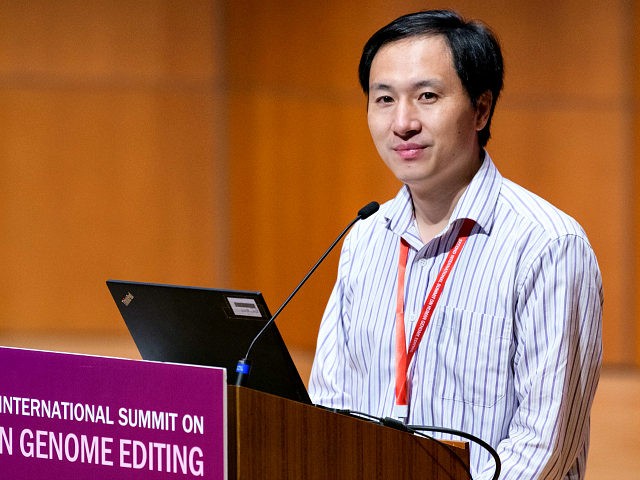The Chinese communist regime confirmed on Monday that He Jiankui, a biophysicist who claimed to produce the world’s first genetically modified babies, had been convicted of several crimes and would serve three years in prison.
In confirming that He had forged documents to get past ethical review of such controversial research — and that he had illegally practiced medicine without a medical degree — Beijing also appeared to confirm that He did what he claimed to do: use a highly experimental technology known as Clustered Regularly Interspaced Short Palindromic Repeats (CRISPR) to alter the genetic makeup of two twin girls, known by the pseudonyms Nana and Lulu. He had also claimed to experiment on a third, at the time unborn, child when he revealed his research in late 2018; Chinese state media reports this week appeared to confirm that “three babies were born.”
Other than their existence, however, Beijing has censored all information surrounding the individuals He experimented on, including not just their identities but their current states of health. Among the top concerns outraged scientists expressed when He revealed that he had genetically modified the children was the fact that CRISPR has yet to be developed into a sophisticated enough technology that someone using it could have complete certainty they are only editing one gene. It is possible that, in attempting to delete a gene to create HIV immunity, He could have destroyed or negatively altered a host of genes making the lives of the children unviable.
Yet the Chinese regime has not indicated that, a year later, the children are dead or even in ill health. The third child, of which even less is known, also appears to be alive, but Beijing has offered no more info, not even including gender.
In announcing that He would face a three-year prison sentence for his crime — along with two colleagues, Zhang Renli and Qin Jinzhou — China’s state media claimed that he forged Chinese government documents to convince actual doctors to implant the embryos he experimented on and help the mothers carry the babies to term, which suggests the possibility that the doctors involved were not aware of the nature of their work. It is also possible the mothers themselves do not know that their children had their genes edited before being implanted through the IVF process.
Chinese state media pronouncements on He this week correspond to confirmations in January that the twins, at least, were born seemingly healthy. With gene editing, however, it may take years or even decades for adverse effects to show, especially if the editing made the children more susceptible to conditions that tend to appear at later ages. If not appearing at an alarmingly early time, it is possible the children themselves will never know they were genetically altered, as some Chinese scientists suggested would be best for them when He revealed his research last year.
The little known about the science behind the experiment, which offers the only existing window into the potential health and well-being of the children, appeared this month at the MIT Technology Review, which published experts of the paper He Jiankui attempted to submit to global scientific journals. The excerpts appear with stern condemnation and specific criticism from scientists, whose primary concern is the fact that the text of the paper claims success, but the data attached to the paper does not confirm the claim.
The paper “makes little attempt to prove that the twins really are resistant to the virus. And the text largely ignores data elsewhere in the paper suggesting that the editing went wrong,” according to the MIT Technology Review. Among other concerns, the publication notes that “the babies’ parents may have been under pressure to agree to join the experiment; the supposed medical benefits are dubious at best; and the researchers moved forward with creating living human beings before they fully understood the effects of the edits they had made.”
Another major concern highlighted is the fact that no doctors appear as authors of the study, which suggests the doctors who implanted the embryos and treated the mothers and children upon birth were not aware of the experimentation.
The worst-case scenario from these conclusions is that the children are dead, which Chinese state media have not asserted. The best-case scenario is that the unintended gene editing did not create catastrophic health problems for the children and that they continue to live under auspices of the secretive Chinese government. MIT Technology Review noted that, if someone shares a news story questioning the fate of the children on the Chinese messaging app WeChat, such as a November story at the Associated Press, “state censors will issue a takedown notice.”
China has not shared the research with any scientists, as far as is publicly known, and Beijing banned all similar experiments.
Follow Frances Martel on Facebook and Twitter.

COMMENTS
Please let us know if you're having issues with commenting.